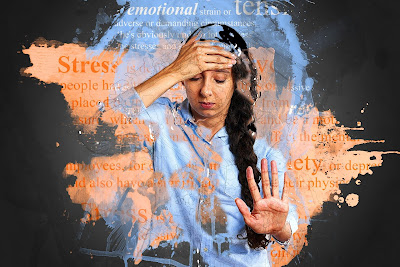Nowadays, everywhere you must have heard a word from people's mouth, about which there is a lot of talk and sometimes people are forced to think that it is not related to us, the name of this word is depression.Depression is a disease that has a negative effect on the way we think, understand and behave. Around 350M people of the world are affected by depression. For some people, the disease of depression can be for a short time, while for some people it can be serious for a very long time which is called major depression or major disorder. This includes thoughts of committing suicide, deep despair and restlessness.
Living in depression, it becomes very difficult to complete daily activities. Sometimes its symptoms appear to be very ordinary, such as mood swings, fatigue or irritability, but they cannot be ignored as simple symptoms.Three areas of the brain are most affected by depression –
1.Hippocampus
2.Amygdala
3.Prefrontal Cortex.
First of all, let's know about the effect of depression on the hippocampus area. The hippocampus area is located in the center of the brain, which is responsible for forming new memories and regulating the hormone cortisol. Cortisol hormone is released from the body when there is physical and mental stress.Its quantity increases significantly during depression. When high levels of cortisol are released over a long period of time, this hormone can reduce the production of new neurons in the hippocampal area. This high level of cortisol can damage the neurons already present in the brain, and when this happens, symptoms of memory loss begin to appear.
Now we know how depression affects the Amygdala area of the brain. The Amygdala area of the brain is responsible for emotional responses such as fear and pressure. Research suggests that people who have depression, their amygdala area becomes larger and more active. This increase in the size and activity of the amygdala is associated with high levels of the hormone cortisol, when this happens, brain activity is now normal and there is no sleep.All these changes in the amygdala can create complications in other areas of the brain as well.
Now we know how depression affects the prefrontal cortex of the brain. The prefrontal cortex is located in the front area of the brain. This area of the brain is responsible for regulating emotions as well as making memory, making decisions, but this area also shrinks when the cortisol hormone is released for a long time.Normally cortisol is high in the morning and low in the night, but people who suffer from depression, especially major depression, their cortisol level is always high. That is, the cortisol level remains high from morning till night, which negatively affects brain functions. Cortisol hormone has the greatest effect on the brain and its level also affects the physical and chemical function of the brain and with its effect depression attacks a normal brain.Depression can also cause inflammation of the brain. According to a study, more than 30% brain swelling is found in people who live in depression for more than 10 years. This inflammation in the brain puts our brain in a bad state because it affects the neurotransmitters that regulate mood, learning and memory. Depression can sometimes lead to injury to brain cells and may even cause brain cells to die.
Symptoms of depression can be seen in the body, but how depression affects the mind, it is known only after some time by the change in the behavior of the person. Apart from normal symptoms like headache, fatigue, back pain, depression also increases the risk of heart disease. Friends, depression is definitely a serious mood disease, but you can also cure it by taking treatment at the right time.
If you liked this information, then definitely share it with your family, relatives and friends. Thank you!

